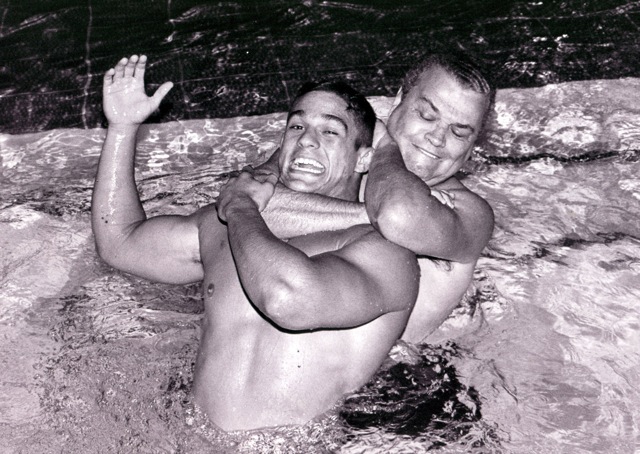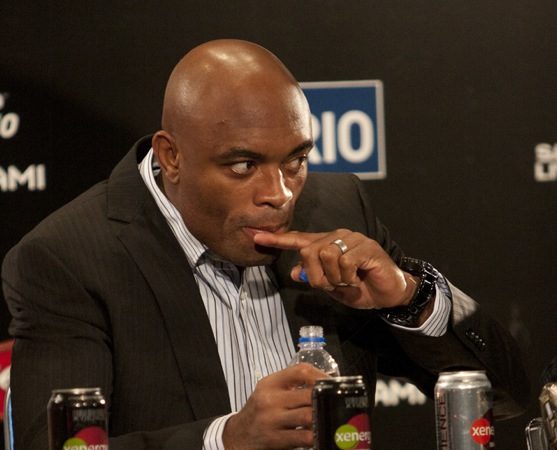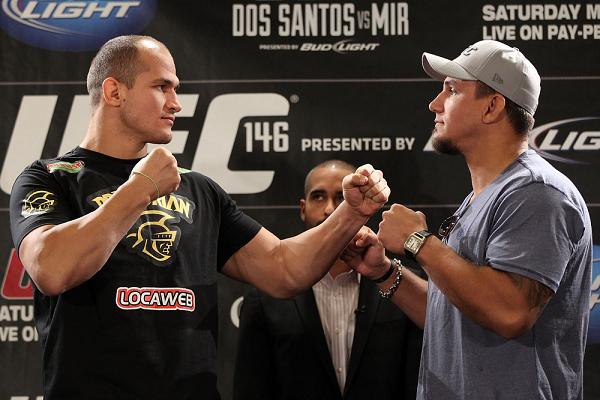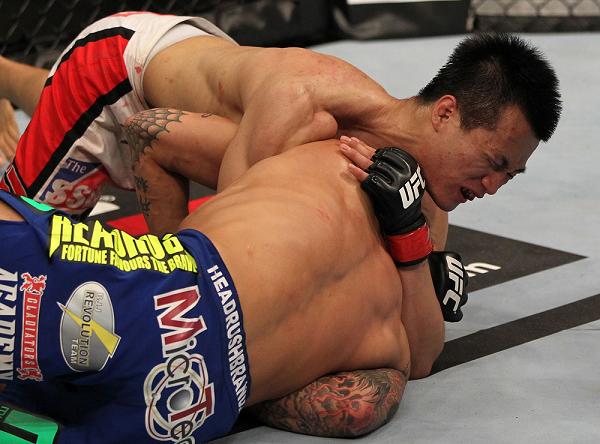
Vitor Belfort in a classic moment with Master Carlson Gracie / Picture from book “Filho teu não foge à luta” by Fellipe Awi
By Mauro Ellovitch
Most Brazilians identify Rocky Balboa as being “the fighter who gets pounded on the whole fight but wins in the end.” That’s the most commercial image of the character played by Sylvester Stallone, derived from the sequels Rocky 2, 3 and, mainly, 4 – where Balboa overcomes Herculean Russian Ivan Drago right in the middle of the Soviet Union. When we think MMA, it’s none to rare that we classify Rodrigo Minotauro as the “Brazilian Rocky Balboa” because of his durability and incredible come-from-behind wins.
Not a lot of people remember how the character from the original Rocky film (the won that won the Oscar for best movie in 1977) wasn’t that almost superhuman American hero. Truth is, the Rocky from the first movie was a major underdog. With a spotty career, he is relegated to second tier fights and is considered run-of-the-mill by his neighbors, friends and even his own coach. When world champion Apollo Creed’s opponent gets injured during the lead-up to a title fight, without time enough left for another top contender to get ready, Creed decides to give a local fighter a chance to save the event. Rocky is chosen because of his nickname, “The Italian Stallion”, which Apollo feels carries commercial appeal.
Even though he’s aware he doesn’t stand a chance, Balboa accepts the challenge just to prove that everyone who underestimated him was wrong, that he could hold out and keep his feet till the final bell. When it’s all over, Rocky loses on points but is ballyhooed for his performance and backed by the woman he loves (“Adriaaaan!”).
During this week preceding UFC 152, Vitor Belfort’s the one most reminiscent of Rocky Balboa.
Unlike the character in the movies, Vitor never did hit rock bottom. However, because of his inconsistent performances, he’s never been seen as a hands-down favorite by fans, and is always being underestimated. Vitor had a meteoric rise as his career began, winning a UFC title at just 19 years of age and earning the moniker “The Phenom.”
From there on out he oscillated between impressive wins against great fighters like Wanderlei Silva, Matt Lindland, Heath Herring and Rich Franklin, and apathetic losses to Randy Couture, Kazushi Sakuraba, Tito Ortiz and Chuck Liddell.
Add to that the unfounded naysaying so common among fans, especially Brazilian ones: calling him “playboy”, saying he’s too hung up on appearing in the media, alleging that he wastes too much time on his famous wife. The one that was went to far was calling him “coward” because he broke his hand in the lead-up to his fight with Wanderlei Silva at UFC 147, supposedly to duck the fight. What a crock.
Personally, I’ve never been a big Belfort fan, perhaps because I can’t identify with the excessive political correctness of his banter. But I feel it’s regretful to overlook a fighter as skilled as Vitor is.
Now Belfort has shut the mouths of his detractors by agreeing to face dreaded champion Jon Jones in the weight class above the one where he has been competing. When previous challenger Dan Henderson was struck with injury in the days preceding the big fight and no top contenders agreed to step in to fight the champ with less than a month to prepare, the “underdog” Belfort took up the challenge. Life imitating art.
Clearly, Belfort hasn’t much to lose in this encounter with Jon Jones. If he loses, he faced one of the most dominant champions of recent years at a weight class above his and did the owners of the UFC a favor. If he wins, he sends shockwaves around the world and makes history.
Honestly, the thing I want most out of this fight, win or lose, is for Vitor to make it a tough, impressive fight. Hit hard, get hit, and prove that he shouldn’t be underestimated. I want to see Vitor Belfort standing when the final bell sounds, with the crowd roaring and him screaming his beloved’s name.
More than ever, Belfort needs to model himself on the original Rocky Balboa. That character who only returned in the sixth film (“Rocky Balboa”, 2006), older, again underestimated and the underdog, and who taught his son the following lesson:
“Nobody is gonna hit as hard as life. But it ain’t about how hard you hit. It’s about how hard you can get hit and keep moving forward; how much you can take and keep moving forward. That’s how winning is done!”
http://www.youtube.com/watch?v=aACN03zzWoo



